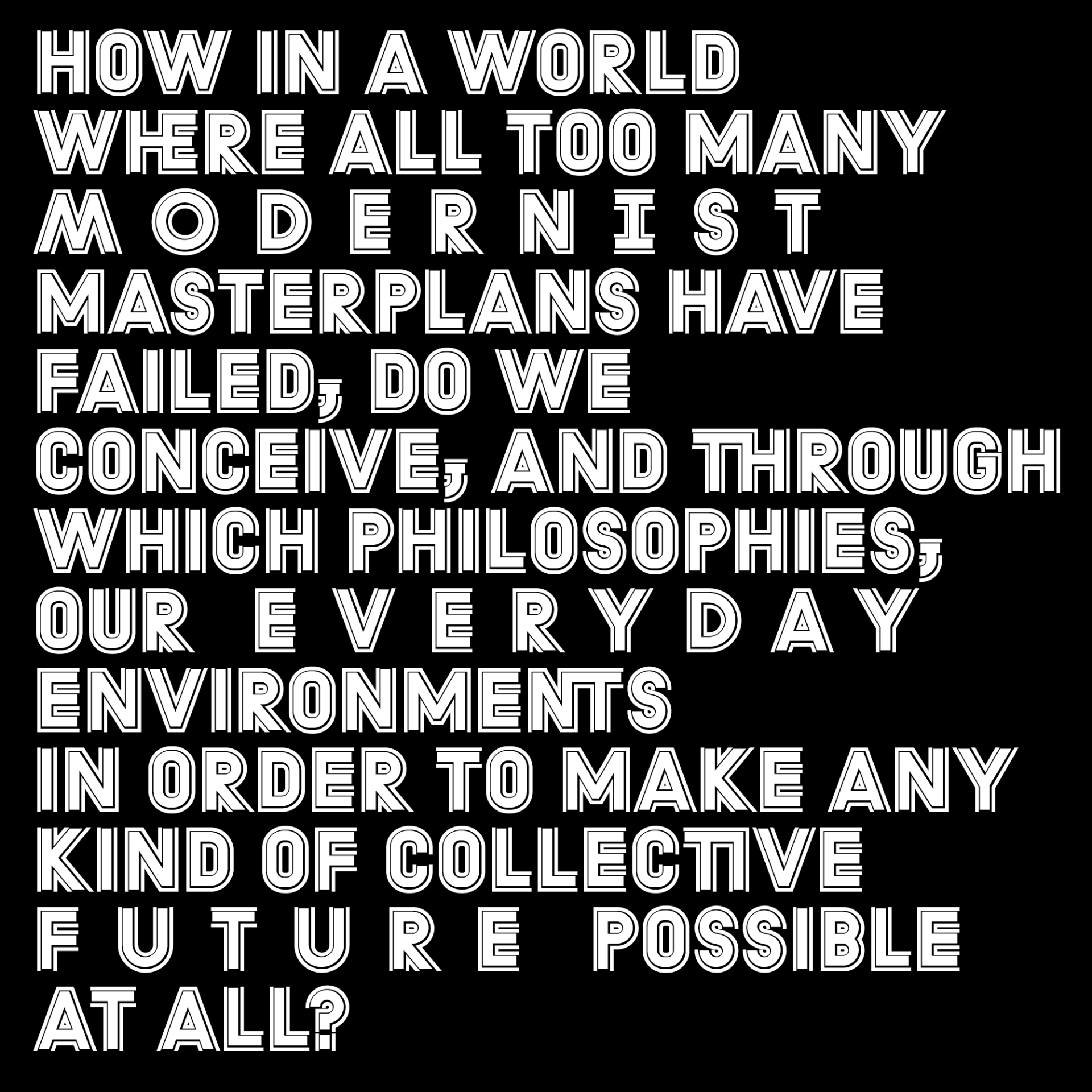Spinning Triangles:
Ignition of a school of design.
Dessau
On the occassion of the 100th anniversary of the Bauhaus, SAVVY Contemporary seeks to challenge and act against the inherent, neocolonial power structures in design practices, theory and teaching with its project Spinning Triangles. It takes up the founding moment of the Bauhaus one hundred years ago and starts from its reality as a school of design to reverse and reshape it.
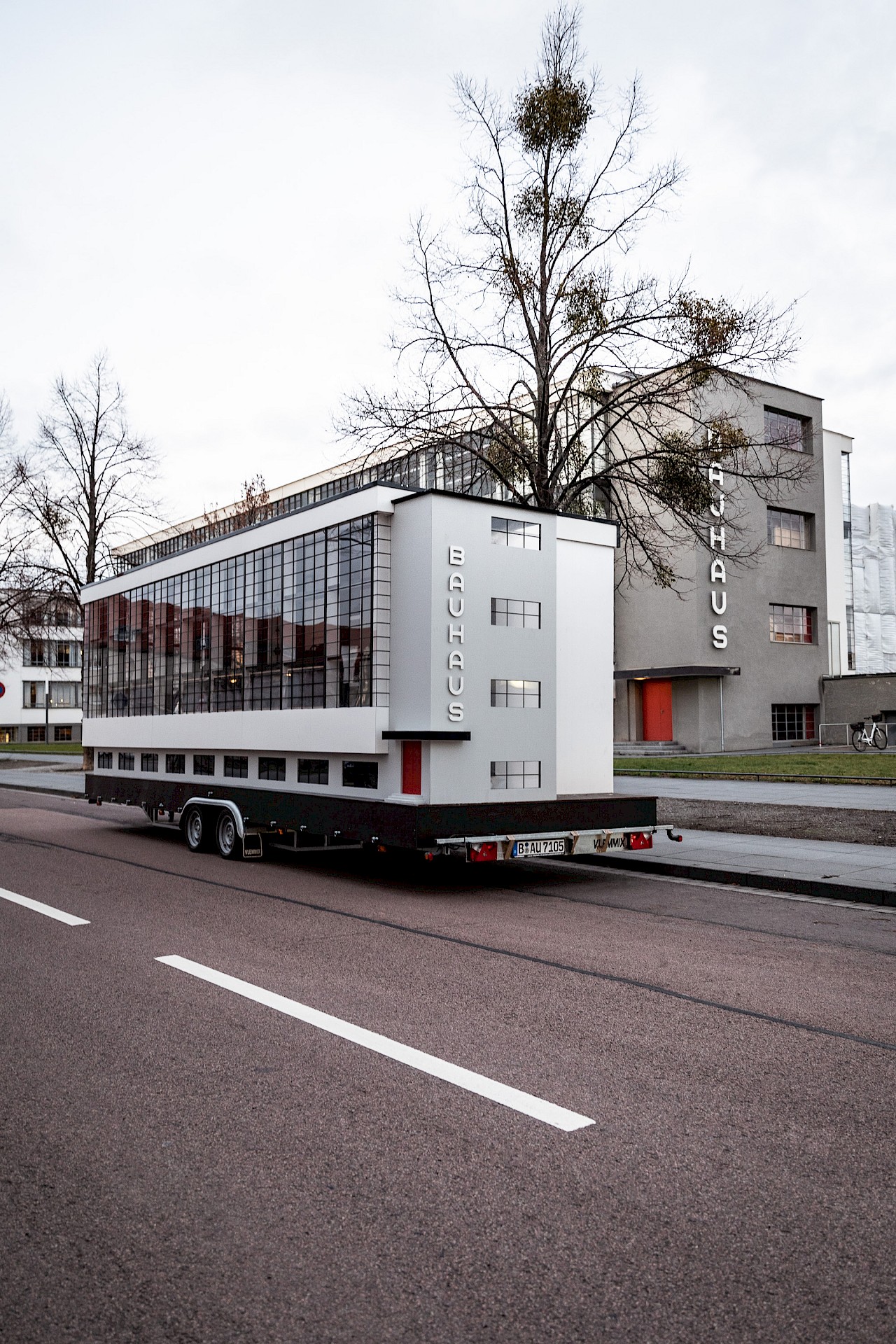
Dessau
prelude 04.01.2019 Hochschule Anhalt
ProgramME 06.01.–13.01.2019 VorOrt Haus Dessau
ProgramME 14.01.–22.01.2019 Hochschule Anhalt
With Decolonizing Design (Luiza Prado, Pedro Oliveira), Lamin Fofana, Saskia Köbschall, Van Bo Le-Mentzel, Lambert Mousseka, Henrike Naumann, Ahmet Öğüt, VorOrt Haus (Alexander Lech, and others)
Artistic Direction Bonaventure Soh Bejeng Ndikung
Curator & Concept Elsa Westreicher
Curatorial Assistance Jorinde Splettstößer
Curatorial Research Raisa Galofre, Arlette-Louise Ndakoze, Abhishek Nilamber, Lili Somogyi
Management Lynhan Balatbat-Helbock, Lema Sikod
Communications Anna Jäger
Cooperators Tinyhouse University, Goethe-Institut Kinshasa, Para Site Hong Kong, Hochschule Anhalt, VorOrt Haus Dessau
The longterm project starts in January 2019 in Dessau where a Bauhaus clone will arrive: Van Bo Le-Mentzel will open a new Tiny House, the “Wohnmaschine” — a miniature version of the workshop wing of the Bauhaus building in Dessau. Its iconic facade gives way to a fifteen square meter apartment with an elaborate interior design and exhibition possibilities. SAVVY Contemporary will not only inhabit these four walls, but also invite guests in order to negotiate space and property and question the complex heritage of modernity. Interventions by various protagonists will activate this mobile “world heritage site” and thus open it up to the public as an “academy of the fireside,” including a reading room.
During this time, we will face the relations of coloniality and design as well as its various visibilities and invisibilities, with contributions by Lamin Fofana, Saskia Köbschall, Henrike Naumann and Ahmet Öğüt. Four workshop formats by Van Bo Le-Mentzel (a Children’s book hack held by SAVVY Contemporary), VorOrt Haus (protest posters honoring Oury Jalloh), Pedro Oliveira and Luiza Prado (on decolonizing design), and Lambert Mousseka (questioning, subverting and recreating graphic novels) will further challenge our perspectives on modernity and modernism and involve the people of Dessau as well as students of Hochschule Anhalt in this process.
The Bauhaus clone will move and shape-shift throughout this process until it will travel to Berlin, carrying with itself a message, exhibited at the opening festival of “100 years of bauhaus” at Akademie der Künste.
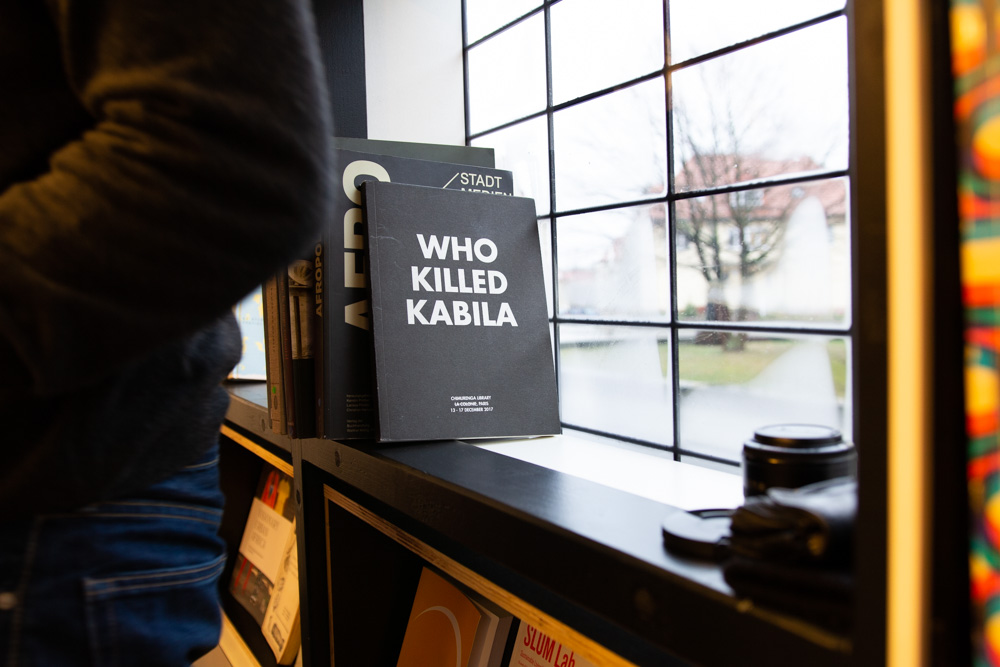
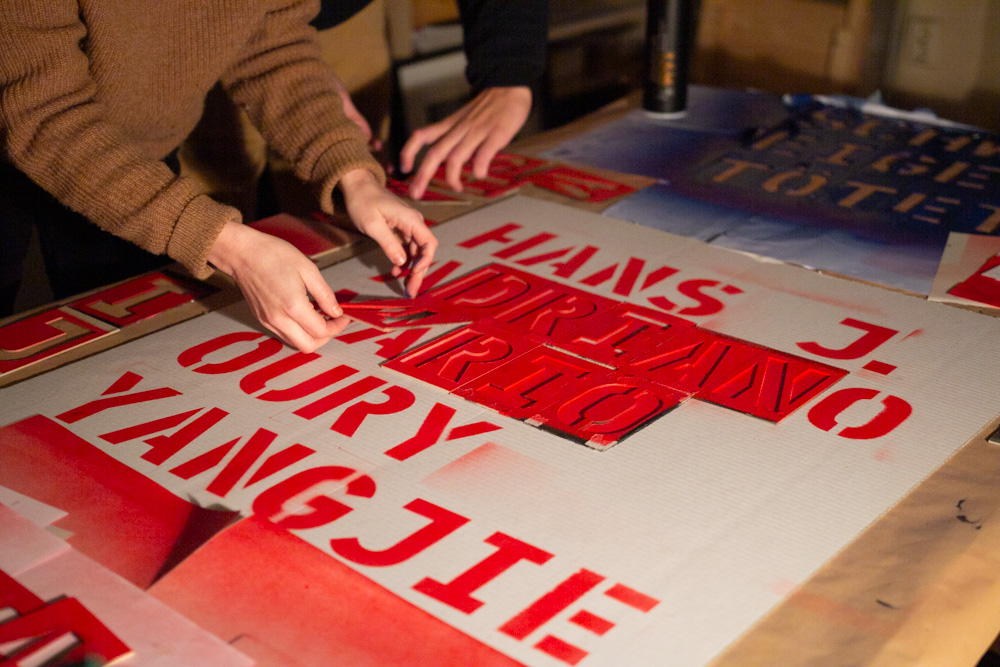
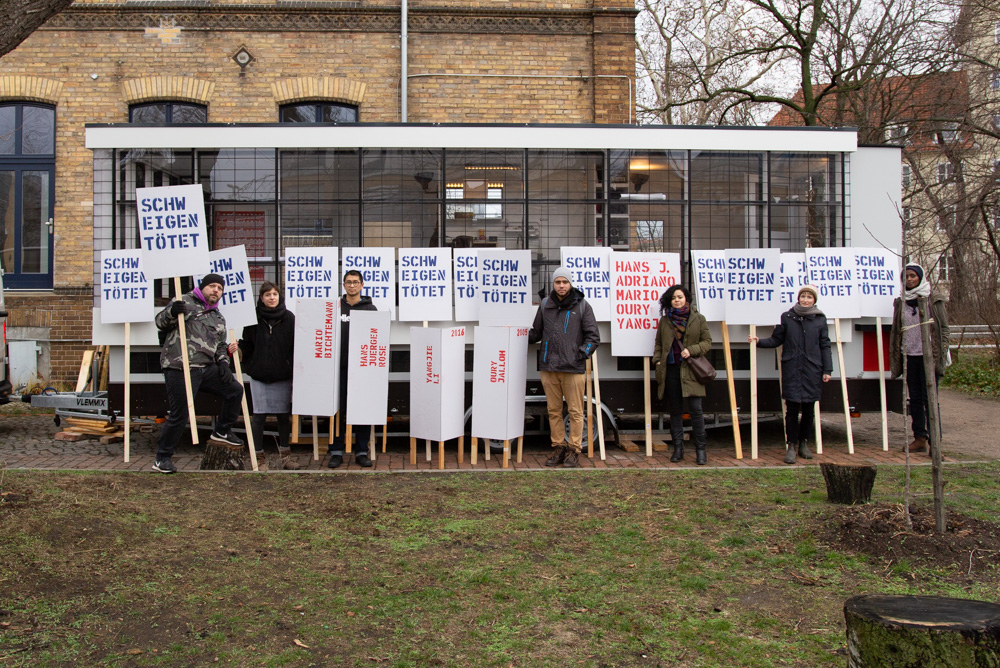
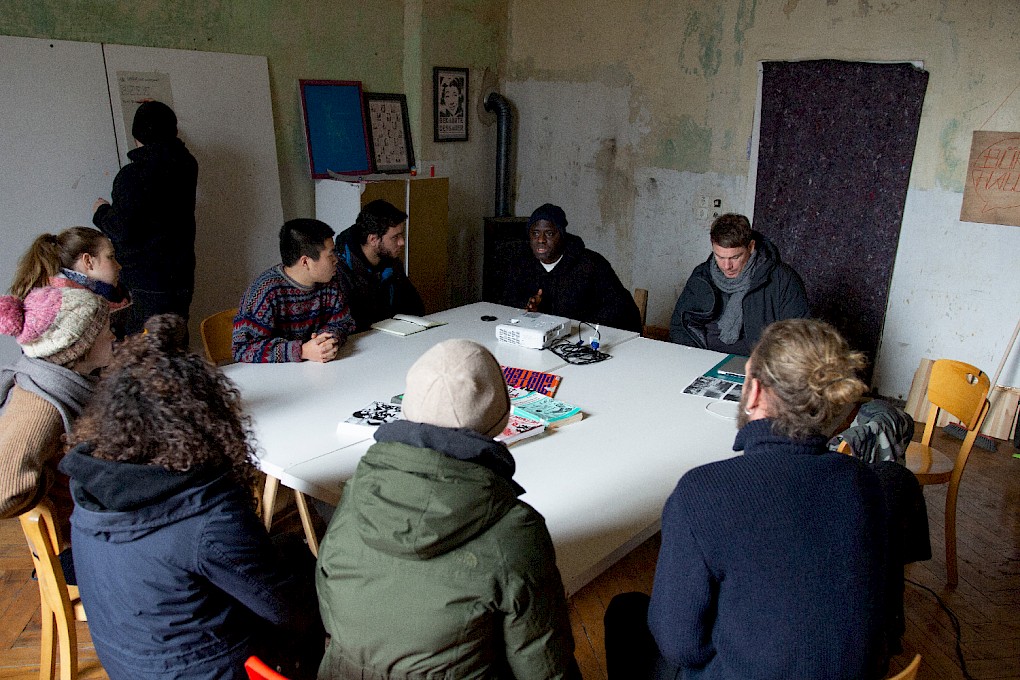
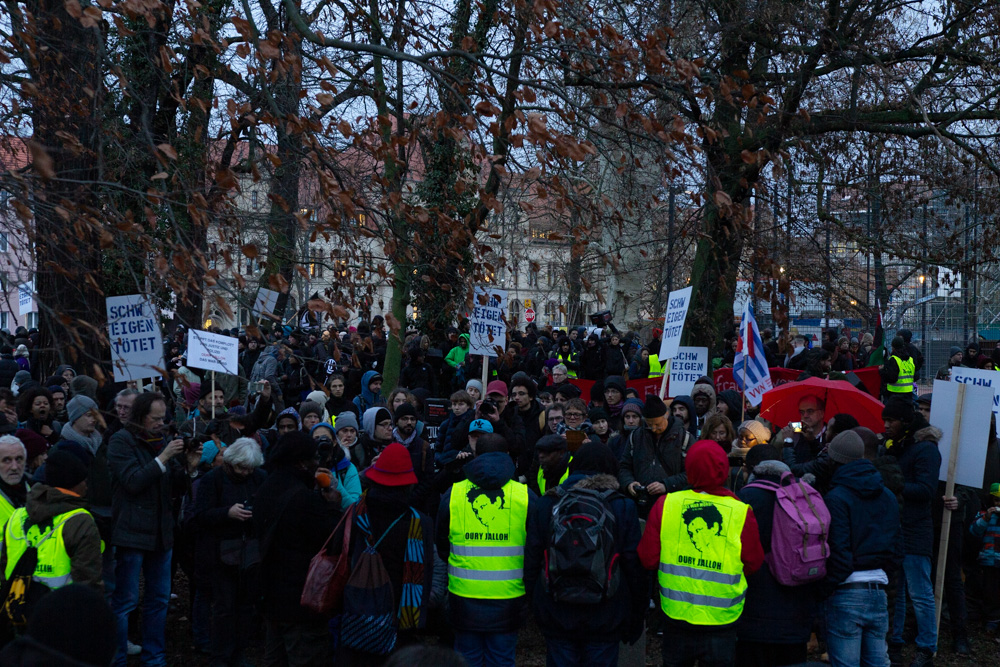
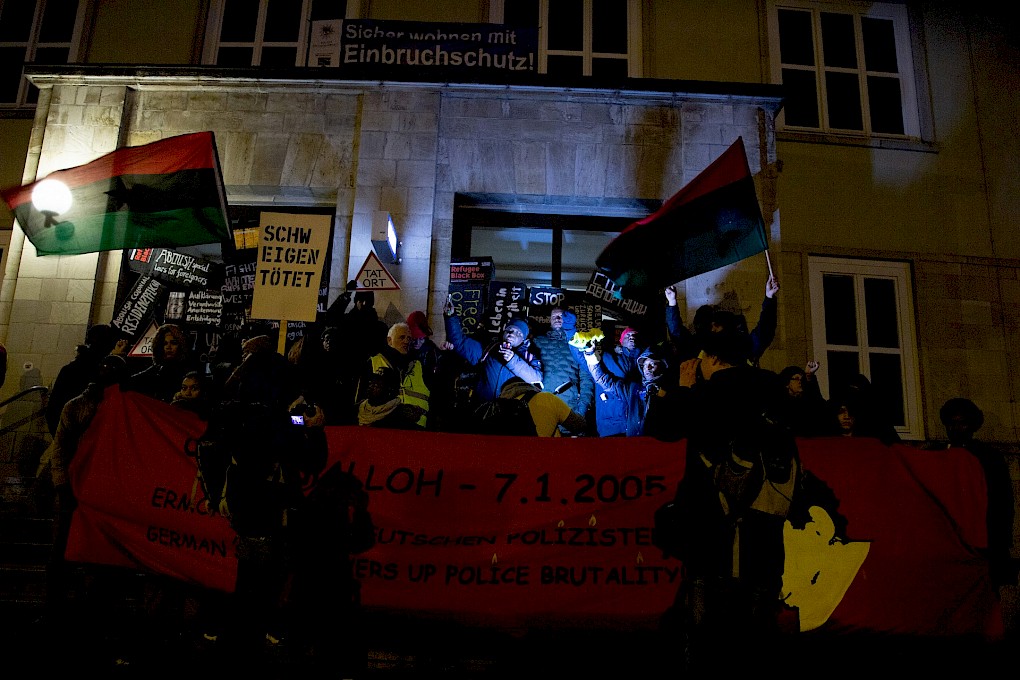
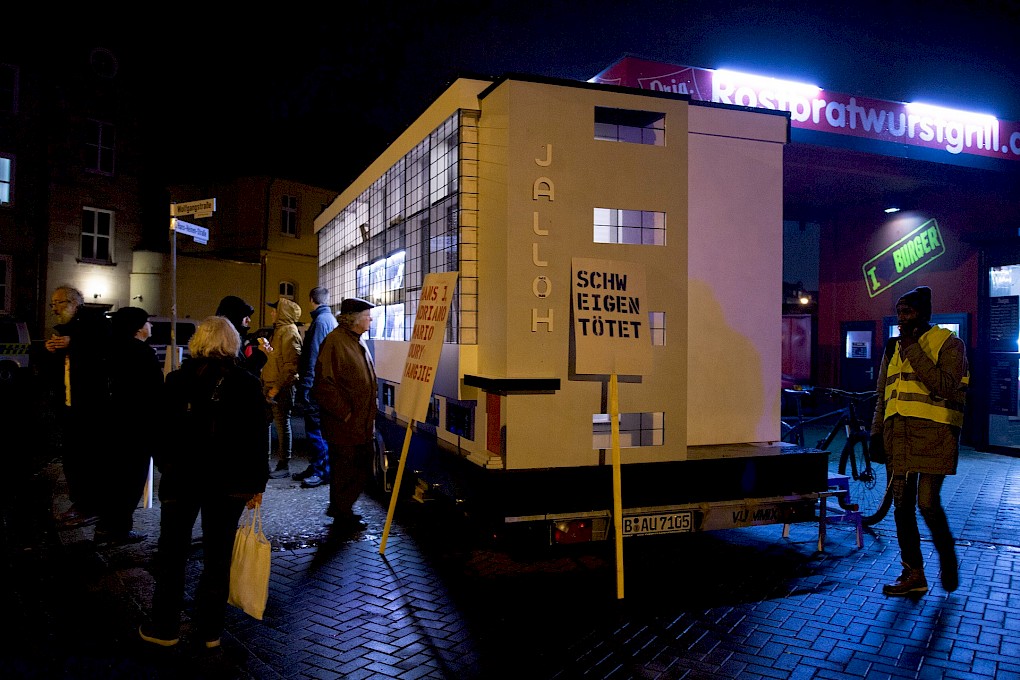
Programme
Fri | 04.01.2019 | 11:00 | Press conference and Introduction | |
Sun | 06.01.2019 | 12:00–18:00 | Workshop PROTEST ACADEMY, Alexander Lech (VorOrt Haus), open to the public, German/English/French translation possible | |
Mon | 07.01.2019 | 14:00 | Oury Jalloh demonstration | |
Wed | 09.01.2019 | 15:00–18:00 | Reading Room open to the public | |
18:30–19:30 | Talk Triangular Stories: Kinshasa – Port-au-Prince – Berlin, Henrike Naumann, open to the public, German/English | |||
Thu | 10.01.2019 | 15:00–18:00 | Reading Room open to the public | |
Fri | 11.01.2019 | 10:00–16:00 | Workshop Impossible Methods, Decolonising Design (Dr. Pedro Oliveira and Dr. Luiza Prado), for students, English | |
18:30–19:30 | Talk 146 years of The Silent University, Ahmet Öğüt, open to the public, English | |||
Sat | 12.01.2019 | 12:00–14:00 | Lunch open to the public | |
15:00–16:30 | Workshop Children’s book hack, for parents, educators, and anyone who is interested to reformulate children’s books, German/English/French translation possible | |||
16:30–17:30 | Reading Room, Coffee and cookies open to the public | |||
19:00–20:00 | Listening session You have confused the true and the real, Lamin Fofana, open to the public | |||
Sun | 13.01.2019 | 14:00–16:00 | Reading from the Children’s book hack for children, open to the public | |
20:00–21:00 | Film screening Surprise, open to the public | |||
Mon | 14.01.2019 | 10:00–16:00 | Workshop Impossible Methods, Decolonising Design (Dr. Pedro Oliveira and Dr. Luiza Prado), for students, English | |
Tue | 15.01.– | 10:00–16:00 | Workshop Comic Counter-legacies: Graphic novels, colonialism, representation, and modernity, Lambert Mousseka, for students, German/English, French and Lingala translation possible | |
13:00–14:00 | Lunch Lynhan Balatbat-Helbock, open to the public | |||
16:00–18:00 | Reading Room open to the public | |||
| Sat | 19.01.2019 | 13:00–14:00 | Lunch Lynhan Balatbat-Helbock, open to the public | |
| 15:00–17:00 | Workshop Spatial meditation on one square meter, Lynhan Balatbat-Helbock, open to the public, German/English | |||
| 18:30–19:30 | Talk Licht, Luft und Sonne! Life Reform, Nudism and German-colonial Entanglements, Saskia Köbschall, open to the public, English/Discussion also possible in German | |||
| Sun | 20.01.2019 | 14:00–16:00 | Workshop Unpacking graphic novels, Lambert Mousseka and students of Hochschule Anhalt, open to the public, recommended for 13–16 year olds, German/English, French and Lingala translation possible | |
| Mon | 21.01.2019 | 10:00–16:00 | Workshop Comic Counter-legacies: Graphic novels, colonialism, representation, and modernity, Lambert Mousseka, for students, German/English, French and Lingala translation possible | |
| Tue | 22.01.2019 | 15:00–18:00 | Reading Room open to the public | |
| 19:00–21:00 | presentation and potluck Lambert Mousseka and students of Hochschule Anhalt present the results from the workshops |
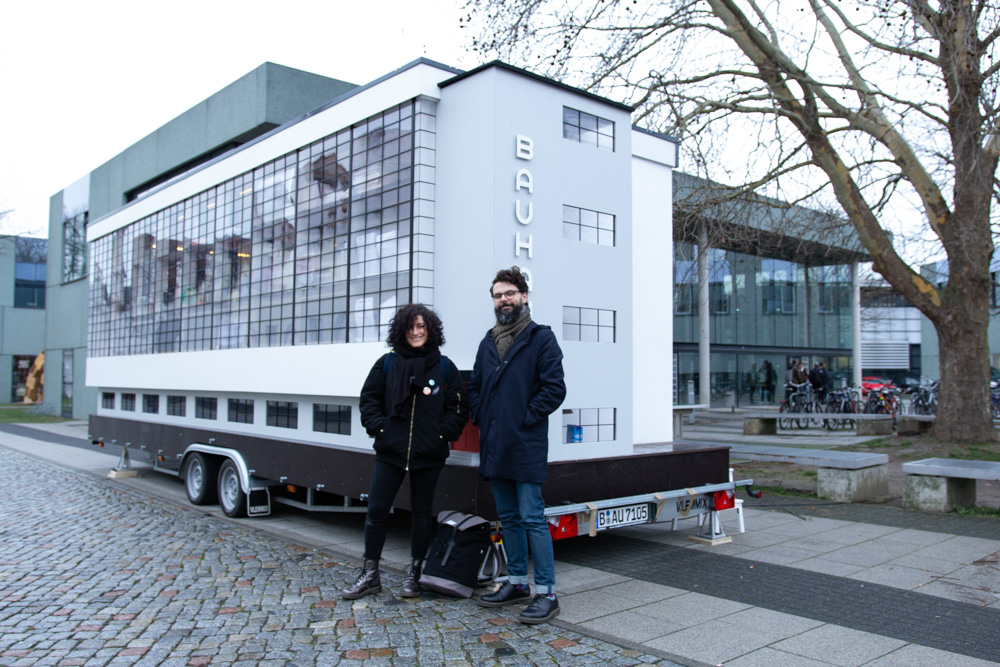
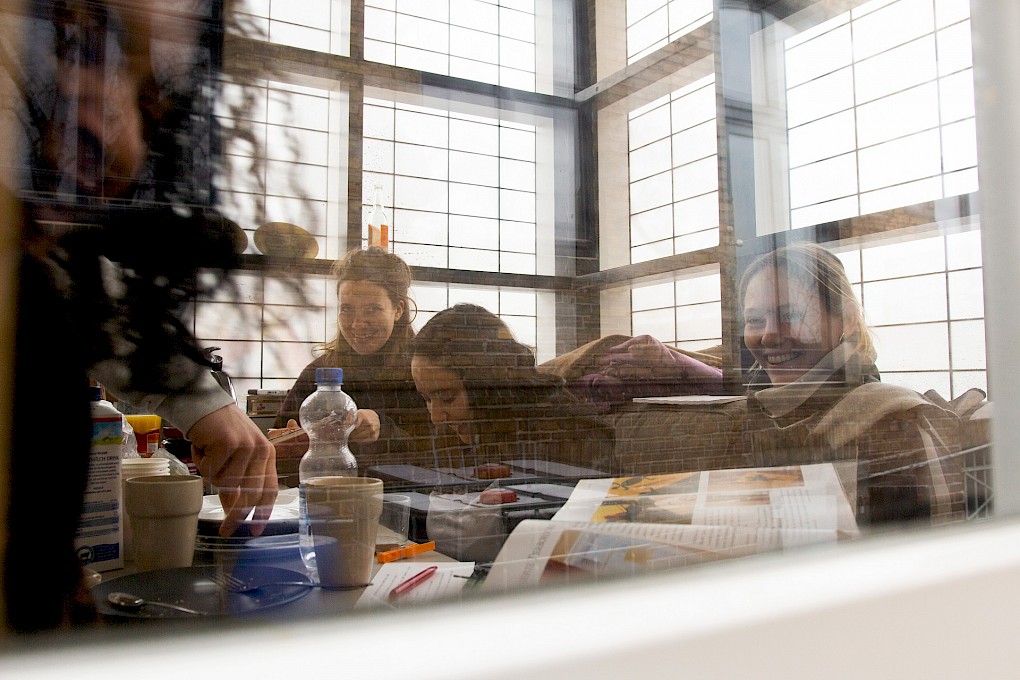
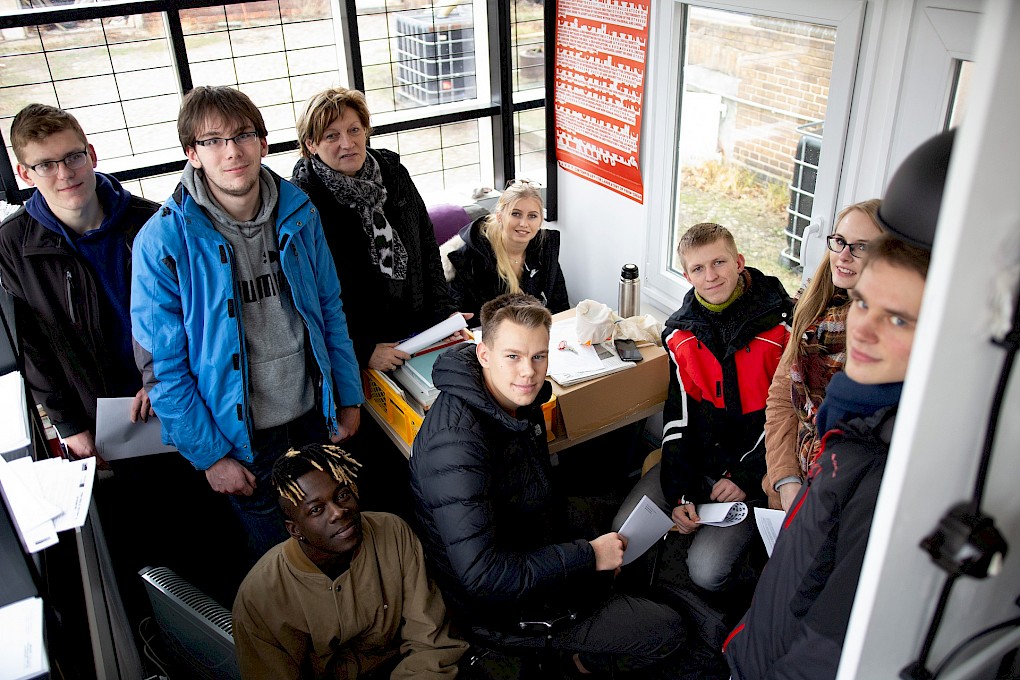
WOHNMASCHINE Installation by Van Bo Le-Mentzel, B-AU 7105 / O Jalloh, dedicated to Oury Jalloh, 04.01.2019–22.01.2019. The “Wohnmaschine” is a new tiny house created by Van Bo Le-Mentzel in the framework of the Spinning Triangles project. It is a miniature clone of the famous workshop wing of the Dessau Bauhaus building that hides a fully functioning, fifteen square meter apartment with an elaborate interior design and exhibition possibilities behind its iconic facade. A home that will shape-shift throughout the process and accommodate several actors, while it tours and obliges its users to playfully and actively engage with its possibilities and impossibilities. SAVVY Contemporary will inhabit this space for two weeks while in Dessau and open up its living room for the public and students of Dessau in order to create an “academy of the fireside”. “Wohnmaschine” is funded by HGH Hildesheim (facade) and the IKEA foundation. Design: Van Bo Le-Mentzel (inspired by Walter Gropius). Construction: Noam Goldstein, Raphael Behr, Patrick Figgle.
VAN BO LE-MENTZEL b. 1977 in Nongkhai, Thailand, is an architect, author (Der Kleine Professor, 2016) and film maker based in Berlin. He is the founder of several initiatives dealing with the relation between design and social participation. Known projects are his Hartz IV furniture (2010), One Sqm House (2013), Karma Chakhs (2013), Tinyhouse University (2015) and the Co-Being House. His furniture and Tiny Houses were internationally exhibited and are part of museum collections (Vitra Design Museum, among others). His proposal of a modular built “100€ apartment” attracted wide attention in the real estate sector. In 2016 his first cinema movie 3 min of Fame, Love and Peace about an interreligious project with Jews and Muslims was released. Le-Mentzel received a number of awards for his initiatives, the ZEIT WISSEN Price “Mut zur Nachhaltigkeit” and Bayreuther Vorbildpreis. His current project is the “Wohnmaschine”. He is engaging in urban development debates with the vision of a “Circular City”, in which social neighbourhoods, parks and industry are set in a circular system.
READING ROOM Selected books and objects from the SAVVY.doc, Colonial Neighbours Archive and beyond, 04.01.2019–22.01.2019, is an integral part of the “academy of the fireside” that SAVVY Contemporary will actualize in the “Wohnmaschine” in Dessau, we will provide books and objects that contextualize the project Spinning Triangles as well as our activities in Dessau and open up new questions and connections for the public, which is very welcome to browse and read during the opening times.
PROTEST ACADEMY Workshop with Alexander Lech, 06.01.2019, 12:00–18:00, German/English/French translation possible, For the commemoration of the 14th anniversary of the murder of Oury Jalloh on 7 January 2019, a preparation workshop will be held in the “Wohnmaschine” at VorOrt-Haus. In this workshop participants engage intensively with the background of the Oury Jalloh case and work collectively on content and design of protest banners. The aim of the workshop is to support the commemoration protest with precise statements and impactful designs.
ALEXANDER LECH is a communication/Integration designer in Dessau. With a qualification in car varnishing, he founded “BÜROHALLO” – an office collective for communication design at the VorOrt-Haus in Dessau, after he studied in China and the US. The focus of the design office is mainly communication design in the sociocultural field, as well as in activating urban processes. Born in Bernburg, Lech is a foundation member of VorOrt e.V. and a lecturer at the TU Braunschweig, Hochschule Anhalt and organizer of typo-graphy and furniture workshops, preferably outdoors.
TRIANGULAR STORIES: KINSHASA – PORT-AU-PRINCE – BERLIN Talk with Henrike Naumann, 09.01.2019, 18:30–19:30, German/English. The artist takes us on a journey from Eastern German furniture stores to an experimental rave museum in Haiti and the aesthetics of power in Kinshasa.
HENRIKE NAUMANN b. 1984 in Zwickau, GDR, growing up in Eastern Germany, Henrike Naumann experienced extreme-right ideology as a predominant youth culture in the 90s. Her work reflects on the history of the right-wing terrorism in Germany as well as on today’s broad acceptance of racist ideas. She is interested in the mechanisms of radicali-zation and how they are linked to personal experience and youth culture. She likes to explore the friction of contrary political opinion through the ambivalence of personal aesthetic taste. In her immersive installations she combines video and sound with scenographic spaces. In recent years she widened her focus to the global connectivity of youth cultures and the reversion of cultural othering. Recent exhibitions include Eurotique at Riga Biennial of Contemporary Art (LV), 2000 at Busan Biennale (KR)‚ Because I live here at MMK Frankfurt and DDR Noir at Galerie im Turm Berlin.
146 YEARS OF THE SILENT UNIVERSITY Talk with Ahmet Öğüt, 11.01.2019, 18:30–19:30, English Talking through 146 years of The Silent University – from a society that encourages studies at home to a radical education platform as participatory action outside of the restrictions of migration laws, language limitations and other bureaucratic obstacles.
AHMET ÖĞÜT b. 1981 in Diyarbakır, Turkey, is a sociocultural initiator, artist and lecturer who lives and works in Berlin and Amsterdam. He is the initiator of The Silent University, which is an autonomous knowledge exchange platform by refugees and asylum seekers. Working across a variety of media, Öğüt’s institutional solo exhibitions include Bakunin’s Barricade,Kunstverein Dresden, DE (2018), Hotel Résistance, KOW, Berlin (2017), No Protest Lost, Kunsthal Charlottenborg, Copenhagen (2017), among others. Öğüt was awarded the Visible Award for the Silent University (2013); the De Volkskrant Beeldende Kunst Prijs 2011, Netherlands; and the Kunstpreis Europas Zukunft, Museum of Contemporary Art, Germany (2010). He co-represented Turkey at the 53rdVenice Biennale (2009).
CHILDREN’S BOOK HACK WORKSHOP with SAVVY Contemporary, 12.01.2019 15:00–16:30, German/English/French translation possible. This workshop is an adaptation of the Crowdbook workshop that Van Bo Le-Mentzel developed as a format to experiment with participatory innovation processes: parents, educators and everyone else who is interested will learn how to hack a children’s book in order to change, replace and reshape problematic content, including obvious and not-so-obvious racisms and binaries. We will print and bind the hacked books, so that each participant can take them home. We will read excerpts to children the next day (13.01.2019, 13:00–16:00). We propose a children’s workshop parallely.
BUILDING A PLACE TOGETHER Workshop with kReAtivUM, 12.01.2019 15:00–16:30, German/English/French translation possible. This workshops runs parallely to the Children's book Hack workshop: The kids create a cosy space for the reading session on the following day. They will build a house with sticks, fabrics, wood, cork and plaster bandages and experience the meaning of building a communal space.
Kreativum the word kReAtivUM consists of RAUM (space) and kreativ (creative), a space located in the VorOrt-Haus where Gabriele Schönherr (ecopedagogist, landscape ecologist and early age educator) and Katja Petry (ergotherapist and design student) offer various workshops for kids and adults.
YOU HAVE CONFUSED THE TRUE AND THE REAL Listening Session with Lamin Fofana, 02.01.2019 18:30–19:30. “The West is an insane asylum, a conscious and premeditated receptacle of black magic.” – Fred Moten. Meditations on black life in contemporary Europe / Reflections on the rampant violent brutal un/reality of white supremacy / How exhausting, tiresome, laborious is it to maintain this fantasy? The economy of looking and being looked at, spectacle and spectatorship, enjoyment and being enjoyed / How debilitating is the level of scrutiny and violence?
LAMIN FOFANA is an electronic producer and artist based in Berlin. His instrumental electronic music contrasts the reality of our world with what's beyond and explores questions of movement, migration, alienation, and belonging. He is from Sierra Leone, lived in Guinea, United States, and currently located in Berlin.
SPATIAL MEDITATION ON ONE SQUARE METER Workshop followed by breathing and basic yoga session with Lynhan Balatbat-Helbock, 09.01.2019 15:00–17:00, German/English. Yoga and its ties to the Bauhaus movement will be some of the core contents of a brief introduction before we try some basic exercises ourselves. How are individuals and their doings at the Bauhaus connected to practices of meditation and in what way are they linked to the different societal masterplans in different epochs? What is our current perception of practices like yoga and body cult? Through our own bodily experience we will try to open the space to actively feel ourselves and deconstruct the perception of those connections.
LYNHAN BALATBAT-HELBOCK is a Berlin based curator and researcher at SAVVY Contemporary. She is part of the participatory archive project Colonial Neighbours, dedicated to discussing silenced histories and to the decanonization of the Western gaze through objects and the stories behind them. She received her MA in Postcolonial Cultures and Global Policy at Goldsmiths University of London. In 2017 she assisted the management for the documenta14 radio program – Every Time a Ear di Soun, SAVVY Funk. She also supported the artist Bouchra Khalili with several projects and exhibitions and most recently designed the production of Agnieszka Polska’s commission for the Hamburger Bahnhof in Berlin (Preis der Nationalgalerie, September 2018 – March 2019). Lynhan is also a practicing yoga teacher and received her teaching certification through Spirit Yoga Berlin (Patricia Thielemann). She has participated in numerous workshops with Matthew Cohen, Lin Min, Max Strom and Krishnataki (Sunshine House Greece). In her own practice and teaching she seeks a more grounding momentum, the healing power of touch and creating the space to balance our hectic daily hustle.
LICHT, LUFT UND SONNE! LIFE REFORM, NUDISM AND GERMAN-COLONIAL ENTANGLEMENTS Talk with Saskia Köbschall, 09.01.2019 18:30–19:30, English/Discussion also possible in German. Taking the author’s personal affiliation with the German nudist movement as a starting point, this paper calls for more thorough examinations of the interrelation between the colonial encounter, its philosophy of racial hierarchies and the life-reform movement, which so profoundly reshaped (German) ideas of community formation based on bodily ideals and human-nature relations. It argues that despite the evident overlap of timing, protagonists and ideas, as well as its noted influence on National Socialism, the coloniality of the life-reform movement remains an academic blind spot. If we take its colonial heritage seriously, what are the political and ethical consequences for our engagement with its legacy in our present, be it in nudist practices, art education theories, the Bauhaus or vegetarian diets?
SASKIA KÖBSCHALL is a Berlin-born curator, scholar and editor with a focus on de-colonial narratives. She completed her graduate studies as a Fulbright scholar at the New School for Social Research anthropology department in New York City, where she also taught at the Parsons School of Design. From 2011 to 2017 she was the manager and a curatorial team member of SAVVY Contemporary. She is the co-editor of the forthcoming art education hi/stories issue of the eJournal – Art Education Research (ZHdK) and a recipient of the Recherchestipendium Bildende Kunst des Berliner Senats 2018.
UNPACKING GRAPHIC NOVELS Workshop with Lambert Mousseka and students of Hochschule Anhalt, recommended for 13–16 year olds, 20.01.2019, 14:00–16:00. German/English, French and Lingala translation possible. During this workshop we will take up one of the sessions held with students earlier this week: we will talk about and unpack the comic “Tintin in the Congo,” deconstruct it and build our own narratives. For more details, see the description of the workshop for students “Comic Counterlegacies.”
LAMBERT MOUSSEKA b. in Kananga (D.R. Congo) studied marketing and puppeteering in Kinshasa, before he moved on to the arts. He completed his studies at the Akademie der Bildenden Künste Stuttgart in 2008. He is working as a puppeteer and stage director, for the Ruhr Triennale for instance. Among others, he has exhibited in D.R. Congo, many other African countries, France, Pakistan, Germany, etc., and has been engaged in several initiatives and artist residencies. In Kinshasa, he co-founded “Espace Masolo”, a space where intergenerational knowledge transfer is happening since then.
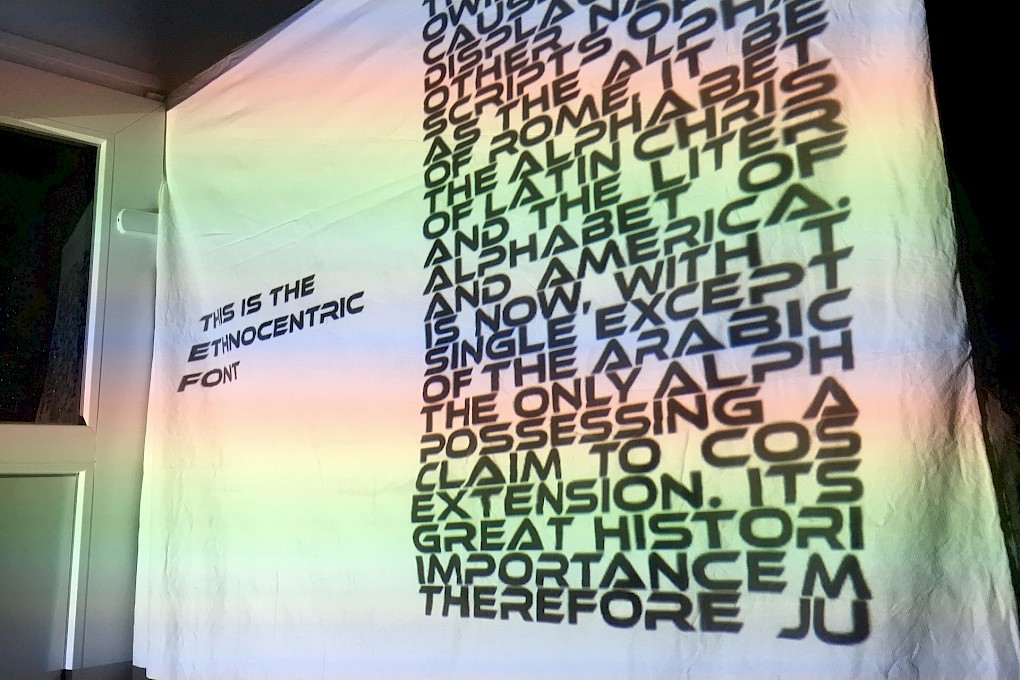
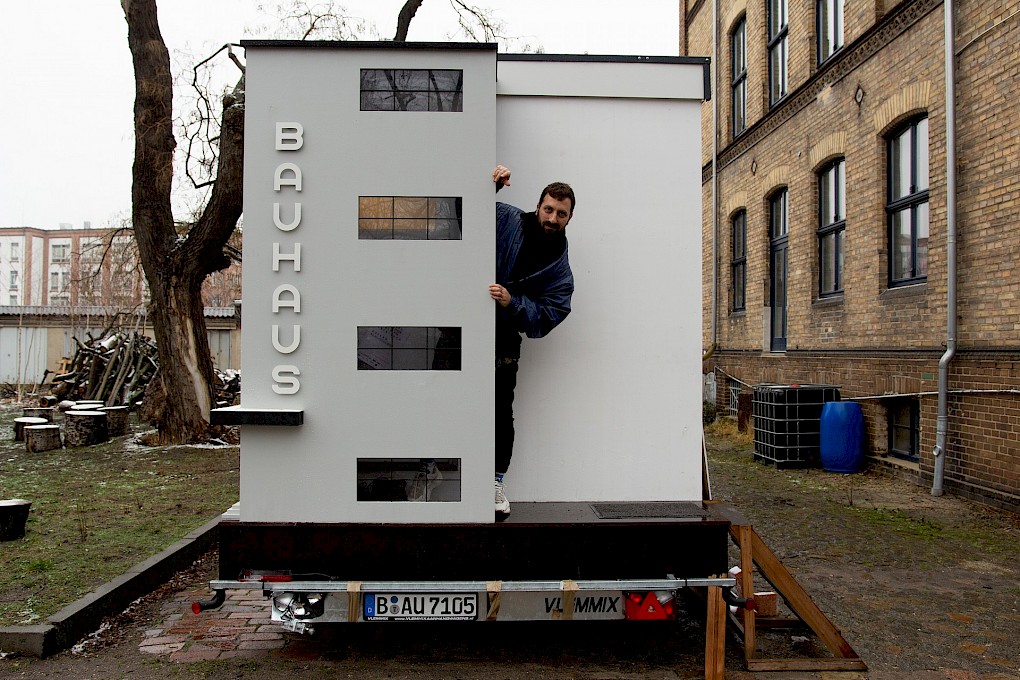
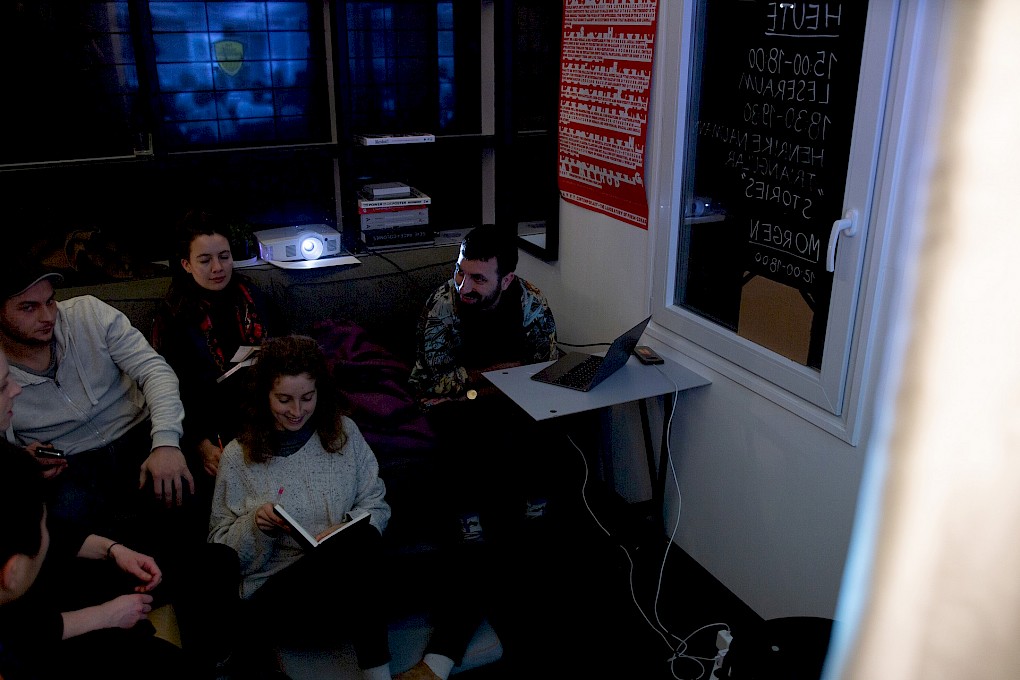
Impossible Methods Workshop for students by Decolonising Design (Dr. Pedro Oliveira, Dr. Luiza Prado), 11.01., 14.01., 15.01.2019, English. The act of designing produces other designs into the world, and does so by intervening in an entanglement of processes, performances, interactions, narratives, and relations that are all context-dependent and socio-culturally informed. In other words, we understand the act of designing as one of producing material discourse; notwithstanding, we argue that the discourses produced by designed things cannot be anything but provisional and performative. In Impossible Methods, participants start out from a designed artifact they are asked to bring to the session – responding to a set of keywords or a statement given by us beforehand – and slowly unpack the networks that inform the existence of that object in the world, as well as its implications in-use. This unpacking can take the form of narrative, performance, mapping, or anything available and/or desired; what matters is not the hows, but the whats and the whys.
decolonising design was founded in 2016 by eight design researchers, artists, and activists stemming from or with ties to the Global South, as a response to Euro- and Anglocentric socio-technical politics and pedagogies of design as both a field of research and praxis. As a research group and online platform, our aim is to invite a “thinking otherwise” about design’s complicity with structural inequalities and marginalities, in a world much shaped by Western, Euro- and Anglocentric systems and institutions (academia being one of them). In that sense, our group does not aim to offer an “alternative perspective” on design, but rather to question the very foundations upon which the discipline was established.
Dr.Pedro Oliveira is a sound artist and researcher. His work inquires the colonial politics of sonic violence, and in particular the articulations of police violence and the policing of bodies through sound and listening practices. His current artistic research intervenes on accent recognition technologies within the migration and border industry in Germany and the EU, and was the recipient of a Research Grant by the Berliner Senat in 2018. He is a founding member of Decolonising Design.
Dr.luiza Prado is an artist and researcher whose work engages with material and visual culture through the lenses of decolonial and queer theories. She is particularly interested in technologies and practices of birth control and their entanglements with colonial hierarchies of gender, race, ethnicity, class, and nationality; her current artistic research project, titled A Topography of Excesses, examines the transmission of indigenous and folk knowledges about herbal birth control in Brazil as a decolonising practice of radical care. She is a founding member of Decolonising Design.
Comic counterlegacy: Graphic novels, colonialism, representation, and modernity Workshop for students by Lambert Mousseka, 05.01.–18.01., 21.01.2019, 10:00–16:00, German/English, French and Lingala translation possible. Colonialism is mainly defined as the sum of those principles that governed past power relationships between Europe and the colonised world. But we need to face the reality, today, that colonisation is still active in our present on many levels and is thus part of everyday “normalities:” it is present in what we read, what we eat, what we drink, how we move. In this workshop, we will actively concentrate on the decolonization of thought-actions and the formtaking it can produce. But such is not possible without talking about racism and other humiliations that are activated in the way we encounter each other, in gestures, language or in the way we conceive our environments and co-living in a space such as Germany. We will talk about these subtle, and not so subtle realities among each other and observe them in the city of Dessau, always in dialogue with the biases of modernism and modernity. To approach this complex subject, we will engage with a practice that is itself manyfold: the comic. Comics are testimonies of biases, but also wishes of the societies that produce them. In the context of the D.R. Congo, where the comic scene has been vibrant for many decades, with a specific and multifaceted history, this complexity is literally drawn into the practice and connected to the colonial power, Belgium, who produced a few highly problematic representations, one of the most famous being “Tintin in the Congo.” We will start by deconstructing this specific comic, and move on to build our own narrative and characters, gliding along topics such as representation, heritage and legacy. Each student group will leave a message, a character or a dialogue, for the next one to develop further, until we will exhibit the result on the fassade of the “Wohnmaschine” and propose a “Comic Counterlegacy” to the public of Dessau, before it moves on to the opening festival of “100 years of bauhaus” in Berlin (Akademie der Künste).
Lambert Mousseka b. in Kananga (D.R. Congo) studied marketing and puppeteering in Kinshasa, before he moved on to the arts. He completed his studies at the Akademie der Bildenden Künste Stuttgart in 2008. He is working as a puppeteer and stage director, for the Ruhr Triennale for instance. Among others, he has exhibited in D.R. Congo, many other African countries, France, Pakistan, Germany, etc., and has been engaged in several initiatives and artist residencies. In Kinshasa, he co-founded “Espace Masolo”, a space where intergenerational knowledge transfer is happening since then.
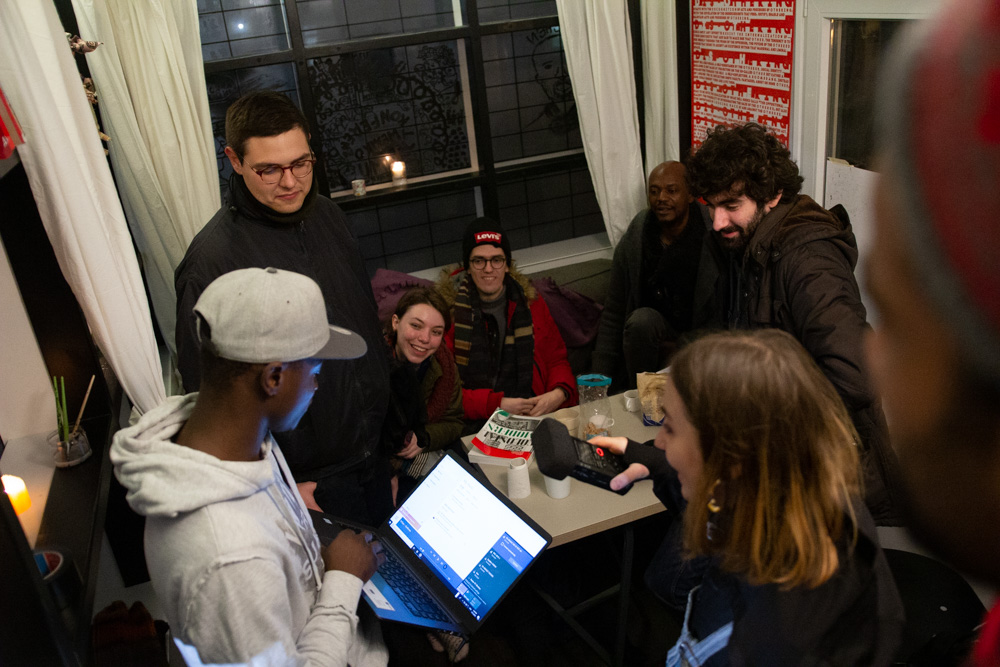
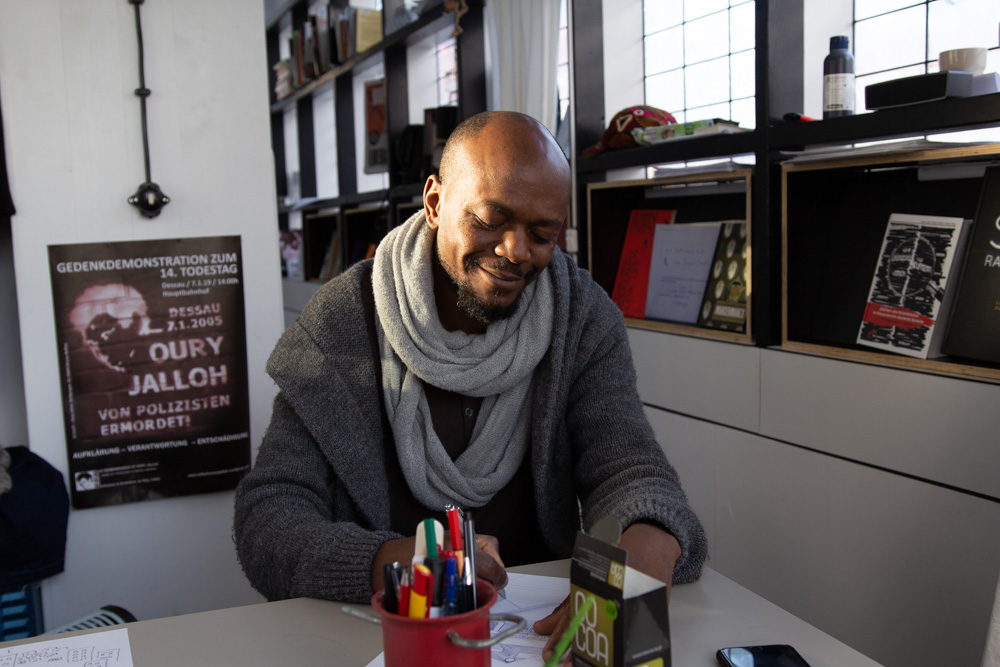
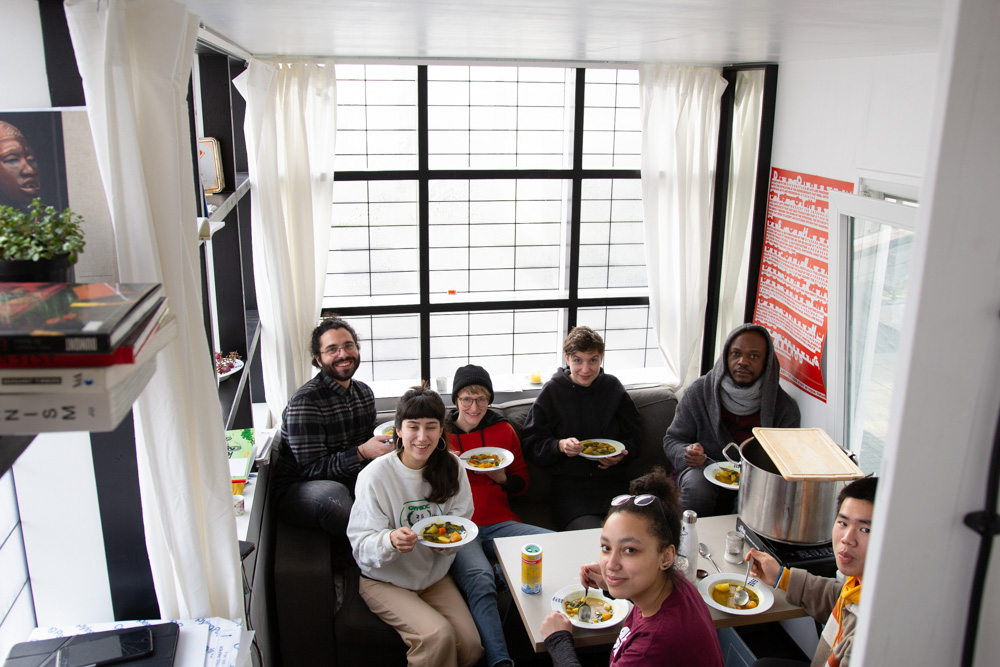
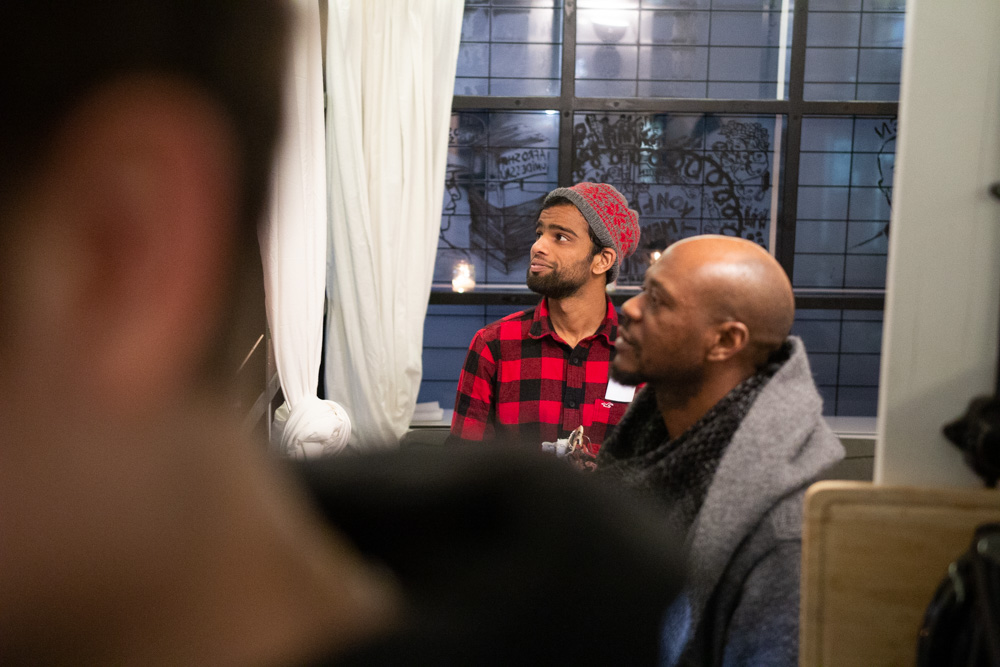
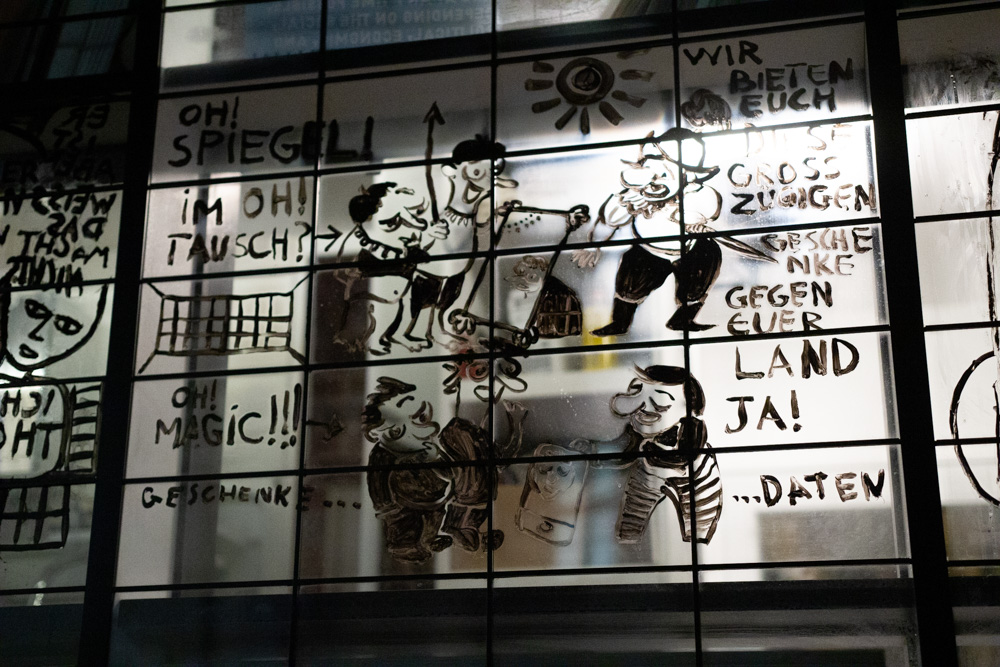
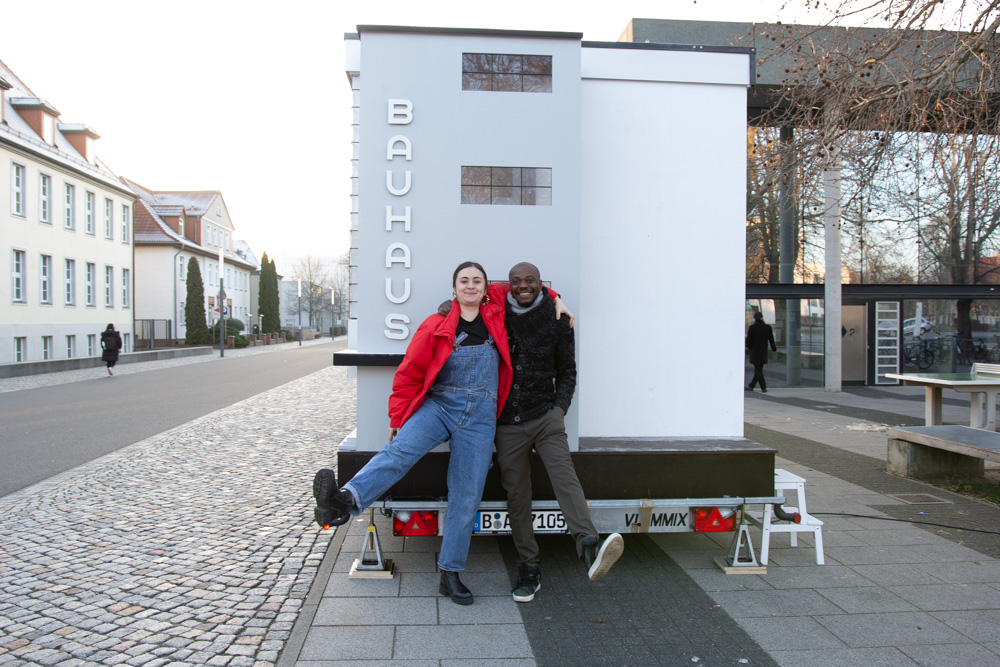
OPEN CALL If you want to be one of fourty students attending the school in Berlin in the summer 2019, you can apply from 01.01. until 15.04.2019. Please send an email to design@savvy-contemporary.com with the subject: “Application Spinning Triangles, school of design”. Please send your CV, a letter of motivation (max. 1 page), and a presentation of your work – in any medium that seems suitable to your practice (portfolio, soundpiece, essay, video presentation or similar, max. 10MB). This school is not limited to any age group or academic background.
Funding Funded by the Bauhaus heute Fund of the German Federal Cultural Foundation. Van Bo Le-Mentzel’s “Wohnmaschine” has been supported by IKEA foundation.


